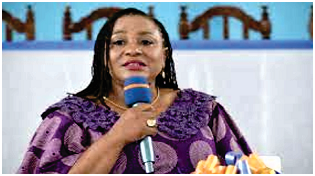The Economic Community of West African States (ECOWAS) has cautioned Liberian security services, mainly the police, to create a level playing field during the course of the ongoing electioneering periods, for the Tuesday, October 10 polls in the country.
ECOWAS Ambassador, Josephine Nkrumah, said the security services, mostly the police, should to remain neutral and professional in the discharge of their duties during this election period, urging them to work with the citizenry for the maintenance of public law and order.
Nkrumah made these comments Saturday, August 19, during the graduation ceremony of more than 600 new police officers who completed 6 months training at the Police Training Academy (PTA) and are expected to be deployed in the counties to beef-up the strength of the other officers there during these elections.
She admonished the new graduates to assure the population that they should have every justifiable reason to have confidence in their ability to serve and protect them at all times, before, during, and after the elections.
Nkrumah also congratulated the government for the level of support, especially to the police in the area of capacity building, in the sustenance of peace and stability, geared towards consolidating the gains made in the peace process.
Speaking also during the ceremony was Acting Deputy Justice Minister for Codification, Abraham Mitchell. He said the security sector plays a crucial role in the growth and development of any nation, stating that improved security is the surest way of attracting investors to the country.
He therefore urged the young graduates to be diligent and dedicated in their service to the nation, and also applauded the police for working alongside other state security services for their efforts towards the maintenance of peace and stability of the country.
For his part, Police Director, Patrick Sudue, cautioned the graduates to be disciplined and neutral in the discharge of their duties. He said the police service is the first line of justice, therefore it is under moral and professional obligations to service and protect the nation and its people.
Sudue then warned police officers to neither partake in political rallies nor wear political parties’ regalia, stating that they are not members of any political party, therefore must not wear political party t-shirts during these electioneering periods.
“As members of the police, we should remain neutral in the discharge of our functions, on grounds that we are not members of any political party; therefore, any police officer caught wearing or in possession of any political party (ies) material, he or she shall be penalized,” he warned.
The graduation of the over 600 new officers is believed to be the largest ever since the establishment of the academy. In 1956, the Liberia National Police was established as a legal institution enacted by law to protect and serve.
Other law enforcement institutes were subsequently enacted to support the process, but the police’ mandate is to maintain public order and safety, protect people and property, identify and recover lost and stolen property, prevent, detect, and fight crime, identify and arrest criminals, and enforce the law and testify in court.
However, after the civil war, rebuilding the police began in 2004. The police component of the United Nations Mission in Liberia-UNMIL (United Nations Police-UNPOL) registered 5,000 people who claimed to be members of the Liberia National Police (LNP) at the time.
Some had no uniforms, and none had been paid for the past few years. They had survived mostly from extracting bribes from the public. Only the traffic division had smart uniforms and could be seen on duty, as their position made it easier to impose spurious fines on motorists.
According to Friedman (2011), UNPOL and Liberian police leaders, through the Rule of Law Implementation Committee, then recruited and deployed an initial interim force of 400 former local police officers to work alongside UNPOL in its efforts to drive out former combatants and reclaim police stations in Monrovia.
They also implemented United Nations Quick Impact Projects, which included the reopening of police sub-stations, taking over roadblocks, and constructing new mini-stations.
In 2011, the International Crisis Group wrote that over 4,000 officers had been trained, including the armed Emergency Response Unit (ERU), and the specialized Police Support Unit (PSU). Of the 4,000 trained police officers, 623 (15 percent) were women.
At a ratio to population of 1:850, and with 65-70 percent deployed in Montserrado County alone, there are clearly not enough officers to cover the whole country.
The ERU, set up in 2008 to combat spiraling armed robbery, is functional and appears efficient, though based on revised needs assessments. It has only 344 officers, instead of the originally targeted 500. The PSU is meant to have 600 members by December.

